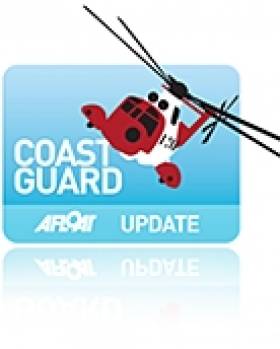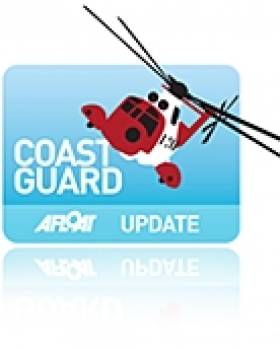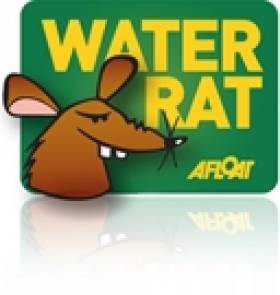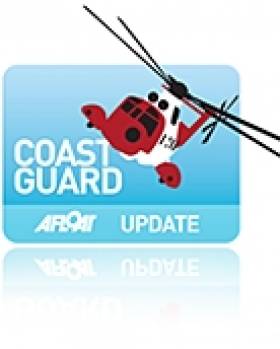Displaying items by tag: Sikorsky
Coastguard Takes Delivery of New Chopper
#COASTGUARD - The Irish Coast Guard has taken delivery of its new search and rescue helicopter at its Shannon base, The Irish Times reports.
As previously reported on Afloat.ie, Sikorsky completed production of the new S-92 helicopter for the Irish Coast Guard last December under the rescue service's €500 million deal with CHC Ireland to revamp the aircraft fleet.
The deal will also see the coastguard's remaining four Sikorsky S-61s replaced by second-hand S-62s from Scotland over the coming months.
Training with crews at Shannon is set to begin shortly ahead of the S-92's first public demonstration at the centenary of the Titanic’s departure from Cobh in Cork Harbour.
Meanwhile, it is expected that the Air Corps may be offered an upgraded air ambulance role, after they were ruled out as contenders for search and rescue work amid some controversy.
The Department of Health has reportedly been in exploratory talks with private firms regarding the provision of an inter-hospital emergency air transfer service, as called for by the Roscommon Hospital Action Group.
The Irish Times has more on the story HERE.
New Helicopter for Irish Coast Guard is Completed
#COASTGUARD - Sikorsky has completed production of a new S-92 helicopter for the Irish Coast Guard under the rescue service's €500 million deal with CHC Ireland.
The US-based helicopter firm and CHC formalised the purchase on Wednesday (21 December) with Irish Coast Guard director Chris Reynolds during a hand-over ceremony at the S-92 commercial helicopter assembly facility in Coatesville, Pennsylvania.
Equipped for dedicated search and rescue (SAR) operations, the helicopter will provide coverage for deep Atlantic Ocean missions, service Ireland's offshore islands and provide rescue cover on the west coast from Cork to Galway.
The new aircraft will be based at Shannon and will replace the current coastguard SAR helicopter, a Sikorsky S-61, which has given 20 years of unbroken service.
According to Sikorsky, the S-92 is equipped with advanced systems and hardware, including an automated flight control system that enables the pilot to fly pre-programmed search patterns and perform delicate hover manoeuvres; a wireless intercom allowing a rescue swimmer to communicate with the crew; radio transceivers to communicate with ships and rescue services; a weather radar and infrared sensor; and a digital video system to record rescues.
Reynolds said the new helicopter - which joins four second-hand machines on a 10-year lease - represents a stepped improvement in Ireland's ability to care for and service its seagoing, coastal and island communities.
"I am very happy that the Coast Guard will operate what I consider to be the leading SAR helicopter in the world," he added.
As reported earlier this year on Afloat.ie, the new chopper is part of a deal that raised questions from a Fine Gael TD over allegations that a competing tender did not have a "good reputation".
Fergus O'Dowd questioning the contract with CHC Ireland after receiving documents in which Chris Reynolds said the Air Corps – whose helicopters are supplied by AgustaWestland - were uneqipped for the role and that no cost saving would be made if they took on the service.
While it might be an exaggeration to say that all of the 21 crew members of Rambler 100 owe their lives to the Irish Search and Rescue service, there are certainly five people whose future prospects were greatly improved by the operation off the Fastnet Rock on August 15th. A lot of media focus has been on Coxswain Kieran Cotter and the crew of Baltimore Lifeboat as well as lifeboat mechanic Jerry Smith, whose dive boat, on charter to the media team of one of the competitors, was on hand to search and recover the five drifting crew. There is no question that this focus is appropriate. RNLI crews all over the UK and Ireland deserve the attention, not only because of their extraordinary voluntary dedication to the cause, but also because such publicity helps swell the coffers of the charity. The service could not operate without the generosity of the donors and incidents such as these help fill the blue boat-shaped boxes held by even more RNLI volunteers.
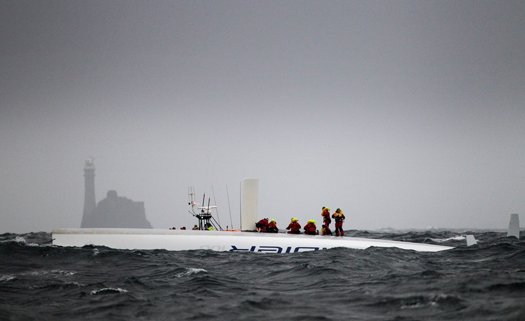
Saved: Ireland's Rescue Services Answered the Call of the capsized Supermaxi Rambler 100 off the Fastnet Rock. Photo: Team Phaedo
The dramatic stories and pictures dominating the media show the front line of a quite wonderful resource that is Search and Rescue in Ireland today. Baltimore Lifeboat was at the coal face of an intricate network of operations, triggered by the crew's EPIRBs. Irish Coast Guard radio officers in Valentia responded almost immediately tasking the rescue resources, working the phones and computers to confirm that this was not an accidentally triggered EPIRB, contacting RORC HQ, determining search patterns and relaying the information to the scene. It was the backroom contacts between RORC and the Coast Guard in endeavouring to contact Rambler 100 using satellite phones that confirmed the possibility of a catastrophic incident involving the Supermaxi. The subsequent tasking of the Shannon and Waterford based Sikorsky helicopters led to the medevac of crew member Wendy Touton and timely treatment of her hypothermic condition, initially by the on-board paramedics and later at Tralee General hospital. And Coast Guard involvement didn't end with the successful rescue – the shoreside operation to provide food and shelter in Baltimore was coordinated by Coast Guard personnel and the salvage operation of the hull of Rambler 100 was overseen by the Irish Coast Guard.
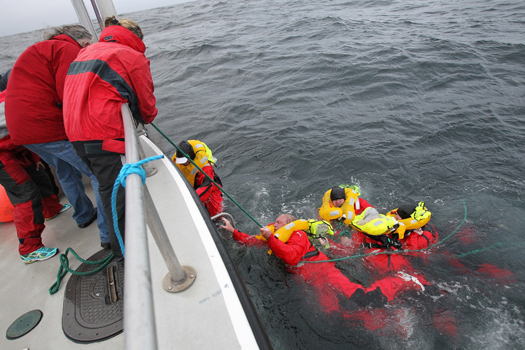
Rambler crew are recovered from the water after a SAR operation by the Irish Coastguard Photo: Team Phaedo. More photos here.
That Ireland has probably one of the best Search and Rescue services in the world goes back to the campaign initiated in 1988 by Joan McGinley, following the death, within sight of land of Donegal fisherman John Oglesby, whose leg was severed in a trawl winch. Eamon Doherty, the late former Garda Commissioner chaired the review group established in response to the campaign and his report led to the establishment of the Irish Marine Emergency Service, subsequently the Irish Coast Guard. Under the guidance of Director Capt Liam Kirwan, the new service moved quickly to become not only the central co-ordinating body for Search and Rescue, but developed its own resources, notably the helicopters, previously tasked in from Irish Air Corps and UK SAR.
Another element that will feature in the Rambler 100 incident is the Marine Casualty Investigation Board (MCIB), set up from recommendations arising from a review of the handling of investigations into marine casualties.
It might be thought that the incident is now closed, but there are many unanswered questions and the investigation will be looking at these and making recommendations that should improve safety in this sector. These questions will include EPIRB performance, liferaft deployment and grab bag usage, but perhaps the key issue yet to be determined is why the response from fellow competitors didn't appear to happen. Even if Channel 16 wasn't being actively monitored, and if not why not, shouldn't the Mayday set off by the Coast Guard have set off the DSC alerts on the radios of Rambler 100's fellow competitors? Had the incident occurred several hours later or earlier when Rambler 100 could have been up to 100 miles from the nearest land, when conditions worsened, we could be looking at much more serious consequences.
It is heartening to think that, in this small country of ours in troubled times, not only do we have a shining star in our search, rescue, recovery and restore system, involving professionals and volunteers cooperating for the greater good, we also have a system that determines the nature of incidents so that we can all learn from the experience.
And let us not forget those people and services, such as the Gardai, Navy, Army and the community of Baltimore who are outside the media spotlight who contributed to this happy ending.
Afloat's Latest Coastguard News
Afloat's Latest RNLI Lifeboat News
Afloat's Latest MCIB News
Search and Rescue Deal Under Question
The Irish Coast Guard's recent €500m deal with CHC Ireland to provide search and rescue services should be investigated, a Fine Gael TD has urged.
According to the Irish Independent, Fergus O'Dowd is questioning the deal after receiving documents under the Freedom of Information act in which the head of the Irish Coast Guard said the Air Corps were uneqipped for the role and no cost saving would be made if they took on the service.
As previously reported on Afloat.ie, the Air Corps' helicopter supplier AgustaWestland strongly disputed allegations that its helicopters did not have a "good reputation".
The contract will see CHC Ireland provide four helicopters (plus one backup) across the country on a 10-year lease. It is understood that this will include one new Sikorsky S-92 helicopters and four second-hand machines from the UK.
Meanwhile, controversy has arisen regarding a similar deal in the UK with a consortium that includes CHC Ireland's parent firm.
The British government has abandoned the procurement process over claims of irregularities in the bidding process of the deal which went to Soteria, a consortium including CHC, Sikorsky and French defence group Thales.
The Irish Independent has more on the story HERE.
Coast Guard Winchman Retires after 30 Years' Service
Noel Donnelly (55), who is retiring after more than 30 years' service, worked as winchman and paramedic. He completed his last shift at the Sligo Coast Guard search and rescue base last week and retires officially this month.
Originally from Tyrone, Mr Donnelly began his career with the Air Corps, flying in Alouette and Puma helicopters. He left in 1984 to take a job as a diver with a civil engineering firm in Aberdeen, Scotland, and subsequently worked as an ambulance driver in Co Kildare. For more about this article please click here


























